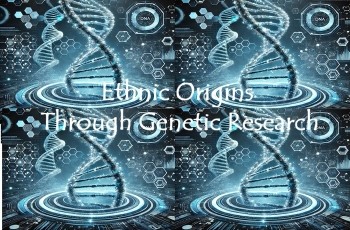シンクタンクからの眼 2021年7月25日
遺伝子から見る民族の起源研究 Ethnic Origins Through Genetic Research

遺伝子から見る民族の起源研究 Ethnic Origins Through Genetic Research
Multidisciplinary Integration Studies on East Asian peoples Origins: An Integrative Viewにおいてこれまでの学際的研究を基に遺伝子研究の観点から東アジアの民族の起源について解明されてきた成果を発表しました。人類の起源を探る研究は、生物人類学や考古学をはじめとする従来の分野に加え、化石の形態分析により進化を明らかにする形態人類進化学など細分化されたアプローチが取られてきました。今回の発表では、日本人、韓国人、そして東アジアに住む人々の起源に関してこれまでの遺伝子研究の成果に基づいて総括しました。
遺伝子研究の概要とその進展をみると、遺伝子研究は1950年代以降に始まり、1970年代から本格化しました。特に近年、分析手法の急速な進化とデータの大量収集が進み、これまでの研究を見直す機会を提供しています。遺伝子データは、塩基配列やゲノムデータベースなどの形で集積され、日本、アメリカ、イギリスなどの統合データベースが設立されました。これにより、世界中の研究者が利用可能なインフラが整備され、新しい発見が期待されています。
現代の人類はアフリカから起源し、そこから世界各地に広がったというアフリカ単一起源説が広く支持されています。しかし、各地で従来存在していた原人との関係については、置き換え説や交配説などの議論が続いています。遺伝子研究は、これらの不明確な部分に光を当て、新たな証拠を提示することで理解を深めてくれると思います。日本人の起源については、南方説と北方説の両方があり、縄文人などを基点とする研究も多くみられています。弥生時代に入ると弥生人が縄文人に取って代わったのか、または両者が混ざってきたのかという点でも議論されています。近年の遺伝子解析では、縄文人と弥生人の遺伝的混合が見られることが明らかになっており、複雑な進化の過程が浮き彫りになっています。韓国人についても、北方起源説と南方起源説が存在しています。特に北方からの遺伝子の影響が強いことが示唆されていますが、近年では南方からの系統も多く見つかっており詳細はまだ不明な点が多いのが現状です。
遺伝子研究は、これまでの学際的研究を支持・補完するだけでなく、新たな理論を打ち立てる役割を果たしています。例えば、遺伝子研究により、人類の起源は多地域論ではなく、アフリカ単一起源論を裏付ける証拠が積み重ねられています。ただし、課題も依然として存在しています。世界中から遺伝子データを収集し分析するには多大な労力が必要であり、分析技術そのものも進化の途中であります。しかし、遺伝子研究の成果は、文化人類学、考古学、歴史学、社会学、民俗学などの分野との学際的アプローチにより徐々に拡大されています。これにより、単なるデータ分析にとどまらず、人類の歴史や文化に関する新しい理解が得られる可能性があります。遺伝子データのさらなる蓄積と分析手法の発展を通じて、人類の起源が科学的に明らかにされることを期待しています。
(笠井信幸、アジア経済文化研究所筆頭理事・東アジア経済経営学会長・SMU特任教授)
Multidisciplinary Studies on Origins of the East Asian Peoples:An Integrative View
The study of human origins has historically been approached through fields such as biological anthropology and archaeology, as well as more specialized fields like morphological human evolutionary studies, which analyze fossil morphology to shed light on evolutionary processes. At the international conference I attended, I gave a summary presentation of the results of genetic research on the origins of Japanese, Koreans, and East Asians.
Genetic research began in the 1950s and became more systematic in the 1970s. In recent years, rapid advancements in analytical methods and large-scale data collection have provided opportunities to reassess earlier studies. Genetic data, such as nucleotide sequences and genome databases, have been consolidated into integrated databases established in countries such as Japan, the United States, and the United Kingdom. These infrastructures have enabled researchers worldwide to access valuable resources, opening new avenues for discoveries.
The widely supported Out-of-Africa Hypothesis posits that modern humans originated in Africa and subsequently spread to various regions of the world. However, the relationship between modern humans and archaic humans who previously inhabited these regions remains a topic of debate, with competing theories such as the Replacement Model and the Interbreeding Model.Genetic research has provided new evidence that sheds light on these unresolved issues, advancing our understanding of human history.
The origins of the Japanese people have been examined through theories such as the Southern Origin Hypothesis and the Northern Origin Hypothesis.Research frequently focuses on the Jomon people as a starting point. During the Yayoi period, the interaction between Yayoi immigrants and the indigenous Jomon people raised questions about whether one population replaced the other or whether interbreeding occurred. Recent genetic analyses indicate a genetic admixture between the Jomon and Yayoi populations, revealing a complex evolutionary process.
Regarding the origins of the Korean population, both Northern Origin and Southern Origin theories have been proposed. While evidence suggests a strong genetic influence from northern regions, recent findings have also identified lineages originating from the south. However, many aspects remain unclear. Future research is expected to provide more concrete evidence on this subject.
Genetic research not only supports and complements findings from interdisciplinary studies but also plays a critical role in establishing new theories. For instance, genetic evidence has increasingly supported the Out-of-Africa Hypothesis while challenging the Multiregional Evolution Theory. However, significant challenges remain, such as the enormous effort required to collect and analyze genetic data globally and the ongoing evolution of analytical methods.
The results of genetic research are increasingly interpreted through collaboration with fields like cultural anthropology, archaeology, and historical sociology. This interdisciplinary approach enables not just data analysis but also deeper insights into human history and culture. With the continued accumulation of genetic data and advancements in analytical techniques, there is great hope that the origins of humankind will be scientifically clarified in the near future.
(Nobuyuki Kasai, Principal Director of the Asia Economic and Culture Academy, President of the East Asian Association for Economic and Business Management, Professor at SMU)




